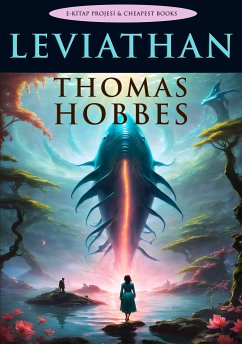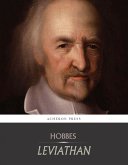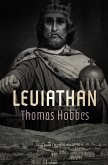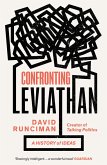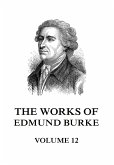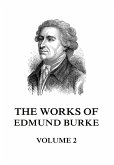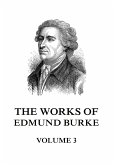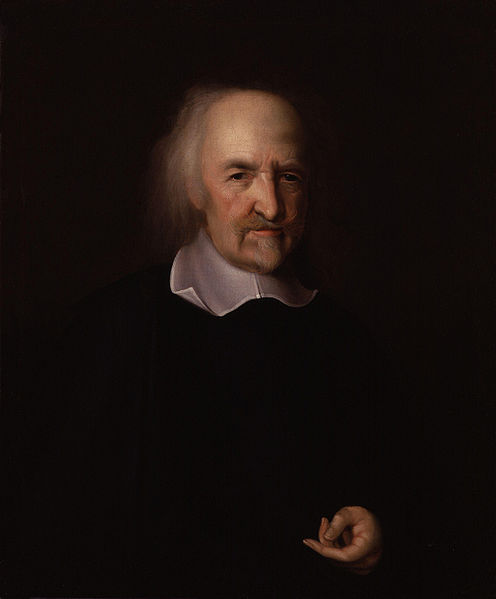Leviathan was written during the English Civil War; much of the book is occupied with demonstrating the necessity of a strong central authority to avoid the evil of discord and civil war.
Beginning from a mechanistic understanding of human beings and the passions, Hobbes postulates what life would be like without government, a condition which he calls the state of nature. In that state, each person would have a right, or license, to everything in the world. This, Hobbes argues, would lead to a "war of all against all" (bellum omnium contra omnes).
The description contains what has been called one of the best known passages in English philosophy, which describes the natural state mankind would be in, were it not for political community:
In such condition, there is no place for industry; because the fruit thereof is uncertain: and consequently no culture of the earth; no navigation, nor use of the commodities that may be imported by sea; no commodious building; no instruments of moving, and removing, such things as require much force; no knowledge of the face of the earth; no account of time; no arts; no letters; no society; and which is worst of all, continual fear, and danger of violent death; and the life of man, solitary, poor, nasty, brutish, and short.
- "Chapter XIII.: Of the Natural Condition of Mankind As Concerning Their Felicity, and Misery.", Leviathan
In such a state, people fear death, and lack both the things necessary to commodious living, and the hope of being able to toil to obtain them. So in order to avoid it people accede to a social contract and establish a civil society. According to Hobbes, society is a population beneath a sovereign authority, to whom all individuals in that society cede some rights for the sake of protection. Any abuses of power by this authority are to be accepted as the price of peace. There is no doctrine of separation of powers in Hobbes's discussion. According to Hobbes, the sovereign must control civil, military, judicial, and ecclesiastical powers.
ABOUT AUTHOR:
Thomas Hobbes of Malmesbury (1588 - 1679), in some older texts Thomas Hobbs of Malmsbury, was an English philosopher, best known today for his work on political philosophy. His 1651 book Leviathan established the foundation for most of Western political philosophy from the perspective of social contract theory. Hobbes was a champion of absolutism for the sovereign, but he also developed some of the fundamentals of European liberal thought: the right of the individual; the natural equality of all men; the artificial character of the political order (which led to the later distinction between civil society and the state); the view that all legitimate political power must be "representative" and based on the consent of the people; and a liberal interpretation of law which leaves people free to do whatever the law does not explicitly forbid. He was one of the founders of modern political philosophy. His understanding of humans as being matter and motion, obeying the same physical laws as other matter and motion, remains influential; and his account of human nature as self-interested cooperation, and of political communities as being based upon a "social contract" remains one of the major topics of political philosophy. In addition to political philosophy, Hobbes also contributed to a diverse array of other fields, including history, geometry, the physics of gases, theology, ethics, and general philosophy.
Early life and education Thomas Hobbes was born at Westport, now part of Malmesbury in Wiltshire, England, on 5 April 1588. Born prematurely when his mother heard of the coming invasion of the Spanish Armada, Hobbes later reported that "my mother gave birth to twins: myself and fear." His childhood is almost a complete blank, and his mother's name is unknown. His father, also named Thomas, was the vicar of Charlton and Westport. Thomas Hobbes Sr. had an older brother, Francis Hobbes, who was a wealthy merchant with no family of his own. Thomas Hobbes, the younger, had one brother Edmund who was about two years older than him. Thomas Sr. abandoned his wife, two sons and a daughter, leaving them in the care of his brother, Francis, when he was forced to flee to London after being involved in a fight with a clergyman outside his own church.
Dieser Download kann aus rechtlichen Gründen nur mit Rechnungsadresse in A, B, BG, CY, CZ, D, DK, EW, E, FIN, F, GR, H, IRL, I, LT, L, LR, M, NL, PL, P, R, S, SLO, SK ausgeliefert werden.

